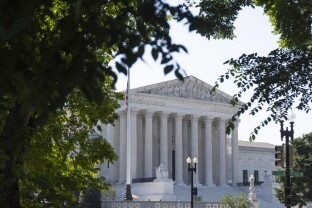The actual question before the Supreme Court on Thursday was in the procedural weeds, delving into the power lower court judges have to block policies nationwide.
But throughout the arguments, justices shed light on how they understand the policy that set the case in motion: President Donald Trump’s Jan. 20 order to block automatic citizenship for people born on U.S. soil to parents who are undocumented migrants or traveling to the U.S. temporarily.
From the start, Justice Sonia Sotomayor said four existing cases already cement the idea that anyone born within U.S. jurisdiction is unquestionably an American citizen.
“Every court has ruled against you,” Justice Elena Kagan pointed out.
Justice Brett Kavanaugh asked the administration’s highest-ranking lawyer how exactly hospitals would suddenly begin to verify the legal status of babies born across the country — and expressed shock that the administration has only given itself a 30-day grace period to create the rules.
It’s unclear how soon the justices could consider the case on the merits, but Justice Neil Gorsuch indicated he’s itching to know. Several justices on Thursday made clear they see the Trump administration’s move to speed the case to the high court as a legal strategy to attack birthright citizenship while simultaneously limiting any legal challenges.
New Jersey’s solicitor general, who is representing 23 state attorneys general who’ve so far halted the Trump administration from putting the plan in place, said that the high court could demand additional legal arguments as soon as tomorrow.
On the question of nationwide injunctions, Justice Ketanji Brown Jackson stressed that judges regularly issue sweeping orders blocking certain kinds of behavior — like a factory spreading toxins or a blatantly unconstitutional presidential policy — because they effectively stop harmful actions against all kinds of victims, protecting even those people who don’t actively join lawsuits.
She threw her hands in the air as she argued the Trump administration’s version of the legal system would force judges across the country to issue similar rulings that narrowly halt government abuse over and over again.
Jackson’s voice boomed across the courtroom when she said that the administration’s view of the legal system “turns our justice system into a ‘catch-me-if-you-can’ regime.”
Sotomayor also attempted to chip away at the administration’s contention that judicial intervention should be vastly limited by applying only to those who take part in legal challenges.
“You’re talking about hundreds of thousands of people,” Sotomayor said. “They would all have to file individual actions? That doesn’t make any sense whatsoever.”
Justice Amy Coney Barrett was the only jurist to openly question whether the White House thinks it has the freedom to simply ignore court rulings. When U.S. Solicitor General D. John Sauer left open the possibility, Barrett seemed alarmed.
“Really?” she asked.
Sotomayor captured her conservative colleagues’ attention when she, three times over, drew an analogy involving a president who summarily seizes Americans’ guns — comments that elicited a wince from Justice Samuel Alito.
“You claim there is no constitutional way to stop a president from an unconstitutional act,” Sotomayor said to Sauer.
The two members of the high court who seemed most aligned with the administration on what was technically the legal matter in question were Alito and Justice Clarence Thomas. The two conservatives have long assailed the way some trial court judges have managed to temporarily halt presidential actions and even laws passed by Congress.
Alito, who spent most of the hearing rocking in his large black leather chair while leaning back with his eyes closed, decried what he deemed self-righteous and deluded trial judges who consider themselves the “monarch of that realm” in their secluded courtrooms scattered across the country.
Meanwhile, Thomas sought validation for his 2018 concurrence in the Trump travel ban case that criticized universal injunctions as “legally and historically dubious.”
“So, we survived until the 1960s without universal injunctions?” Thomas asked aloud.
—
Jose Pagliery is a reporter at NOTUS.
Sign in
Log into your free account with your email. Don’t have one?
Check your email for a one-time code.
We sent a 4-digit code to . Enter the pin to confirm your account.
New code will be available in 1:00
Let’s try this again.
We encountered an error with the passcode sent to . Please reenter your email.


